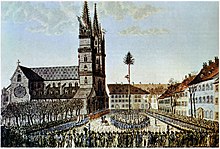Wernhard Huber
Johann Wernhard Huber (born February 22, 1753 in Basel ; † January 10, 1818 in Bern ) was a Swiss pharmacist , politician and poet .
life and work
Wernhard Huber was the first and only son of the pharmacist Hans Jakob and Ursula, née Schnell. His father died when he was four years old and his mother three years later.
As an orphan, he grew up with his grandparents, who were members of the Moravian Brethren , in a house on the Schifflände in Basel. Together with his grandmother and Philipp Heinrich Gemuseus (1749–1805) Huber traveled to Herrnhut and spent his first school years in the Herrnhut educational institution in Neuwied .
Huber was enrolled in the Philosophical Faculty of the University of Basel in 1766. From 1767 to 1770 he completed an apprenticeship as a pharmacist in Hieronymus Bernoulli's (1669–1760) shop and from 1771 to the end of March 1772 he worked as an assistant under the administrator Martin Heinrich Klaproth in the pharmacy of the late Valentin Rose . After returning to Basel, he took over the management of his father's pharmacy and in 1776 married Maria Judith, née Fahrtisen. Subsequently, both joined the «Basler Sozietät».
In 1780 Huber made the acquaintance of Johann Kaspar Lavater and they were in contact by letters for several years. Huber was also the editor of a collection of his own poetic experiments. When Johann Gaudenz von Salis-Seewis was in Basel, he visited Huber and bought the poem «Silhouette» from him.
Huber as a politician

Huber joined the Helvetic Society in 1787 and in the same year was a co-founder of the Basler Allgemeine Lesegesellschaft , whose committee consisted of Werner de Lachenal as head, Peter Ochs as councilor, Huber as clerk and a further 21 members. When Wilhelm Ludwig Steinbrenner visited Basel in the summer of 1790, Huber introduced him to the reading society. Many of the reading society's books were donated by Huber. In 1799, Huber was able to receive the entire inventory of works of art and writings from her deceased husband from the widow Salomen Gessner .
Huber was an enthusiastic supporter of the French Revolution and had the motto "Live or die free" engraved on his finger ring. From January 1798 he was a co-initiator of the Basel Revolution and President of the first Basel National Assembly. Shortly thereafter, he was elected to the government committee, then to the "constitutional committee"; Huber also had to preside over the hall inspection. From April 1798 Huber was a member of the Helvetian Council. When the board of directors invited the councils to honor the storming of the Bastille on July 14th with a celebration, Huber went even further and demanded that this day be celebrated in Helvetia.
Huber campaigned for freedom of thought, freedom of association, freedom of the press and freedom of conscience. He campaigned in vain for the abolition of the tithe tax and took a negative position in relation to the "general freedom of trade".
In the summer of 1800 Huber's political career seemed about to end. Wernhard Huber was one of the members of the Grand Council who were constitutionally forced to resign by lot; the decision was made on August 1st. A few days later, on August 8, the second coup brought the two Swiss parliaments to an end altogether, and among the fortunate 35 that the Executive Committee appointed to a new legislative council was Huber, who thereby received a new parliamentary seat. During this time he gave Johann Georg Tralles the honorary citizenship .
In the autumn of 1801, when the days of the old Helvetian parliament came to an end due to the Malmaison constitution , Hubert's parliamentary activity also ceased.
As Huber as the leader and organizer of the revolution of 1798 was bad to speak of in Basel, Huber stayed in Bern as a private scholar . Five years after his death, his wife died in Aarwangen .
literature
- Wernhard Huber: Sparks from the herd of his larvae of friendship, truth, jokes. Nabu Press, 2012. ISBN 124868964X
- Paul Wernle : Wernhard Huber, the Swiss Grand Councilor and Basel poet . In: Basler Zeitschrift für Geschichte und Altertumskunde , Vol. 20, 1922, pp. 59–126. ( Digitized version ).
Web links
- Wernhard Huber . In: State Archives Basel-Stadt
- Karin Marti-Weissenbach: Huber, Johann Wernhard . In: Historical Lexicon of Switzerland
Individual evidence
- ↑ Thomas Schibler: Philipp Heinrich Gemuseus (1749-1805). Historical Lexicon of Switzerland, accessed on May 27, 2020 .
- ^ Paul Wernle: Wernhards Huber poems from 1881. Accessed on May 27, 2020 .
| personal data | |
|---|---|
| SURNAME | Huber, Wernhard |
| ALTERNATIVE NAMES | Huber, Johann Wernhard |
| BRIEF DESCRIPTION | Swiss pharmacist, politician and poet |
| DATE OF BIRTH | February 22, 1753 |
| PLACE OF BIRTH | Basel |
| DATE OF DEATH | January 10, 1818 |
| Place of death | Bern |